Managing a large business comes with unique challenges. Handling thousands of customers, streamlining operations, and staying efficient can become overwhelming.
That’s where AI-powered enterprise chatbots come in.
These aren’t just basic bots. Instead, they leverage advanced AI to automate a large volume of inquiries and seamlessly integrate into existing systems to enhance efficiency and reduce operational costs.
In this guide, we’ll take you through what makes enterprise chatbots different, why they matter, and how they’re reshaping business operations to deliver real ROI for enterprises worldwide.
Let’s dive right in!
Leverage the power of chatbots today
What are enterprise chatbots?
Enterprise chatbots are a step above your average chatbot. They’re built to handle the unique needs of large organizations, like managing complex and high-volume interactions with precision.
Unlike standard chatbots, which might answer basic FAQs or assist with straightforward queries, enterprise chatbots offer human-like support across multiple channels and topics. This makes them a cost-effective, scalable solution for large businesses.
An AI-powered enterprise chatbot also seamlessly integrates with enterprise systems like CRMs, ERPs, and other tools your team uses on a daily basis. This allows them to access and process huge amounts of data to deliver relevant responses.
Take Lyro, a leading enterprise AI agent. Lyro can resolve detailed customer queries by pulling information from multiple data sources, recommending products, or automating IT support tasks, like managing tickets and escalations. This level of functionality saves time, reduces manual effort, and ensures smooth, scalable interactions across the board.
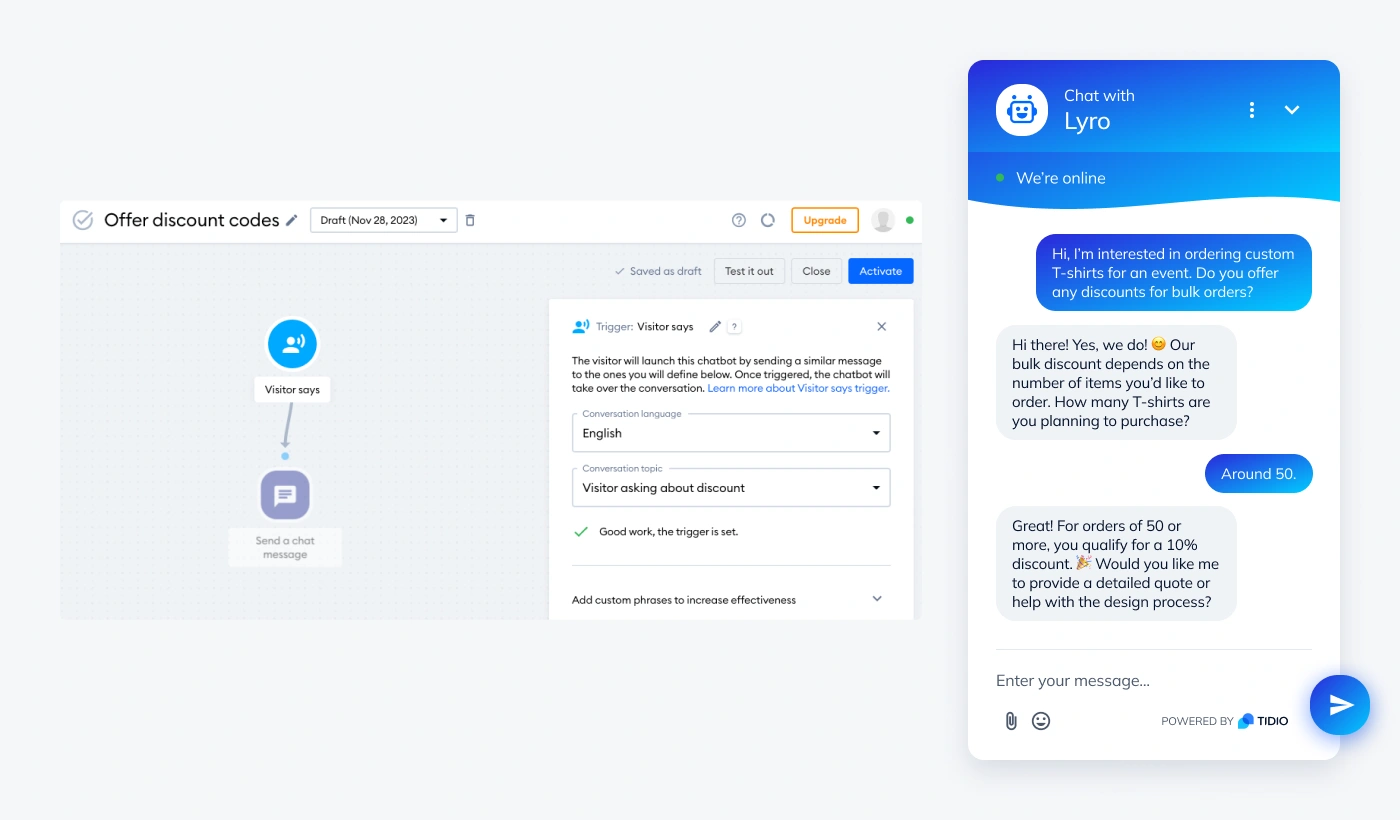
Why enterprise chatbots are essential
The financial and user experience impact of enterprise chatbots is undeniable. Faster response times, reduced labor costs, and a significant increase in conversions make chatbots one of the most cost-effective AI investments for enterprise businesses.
Here are the main benefits reported by enterprise businesses using AI in customer service:
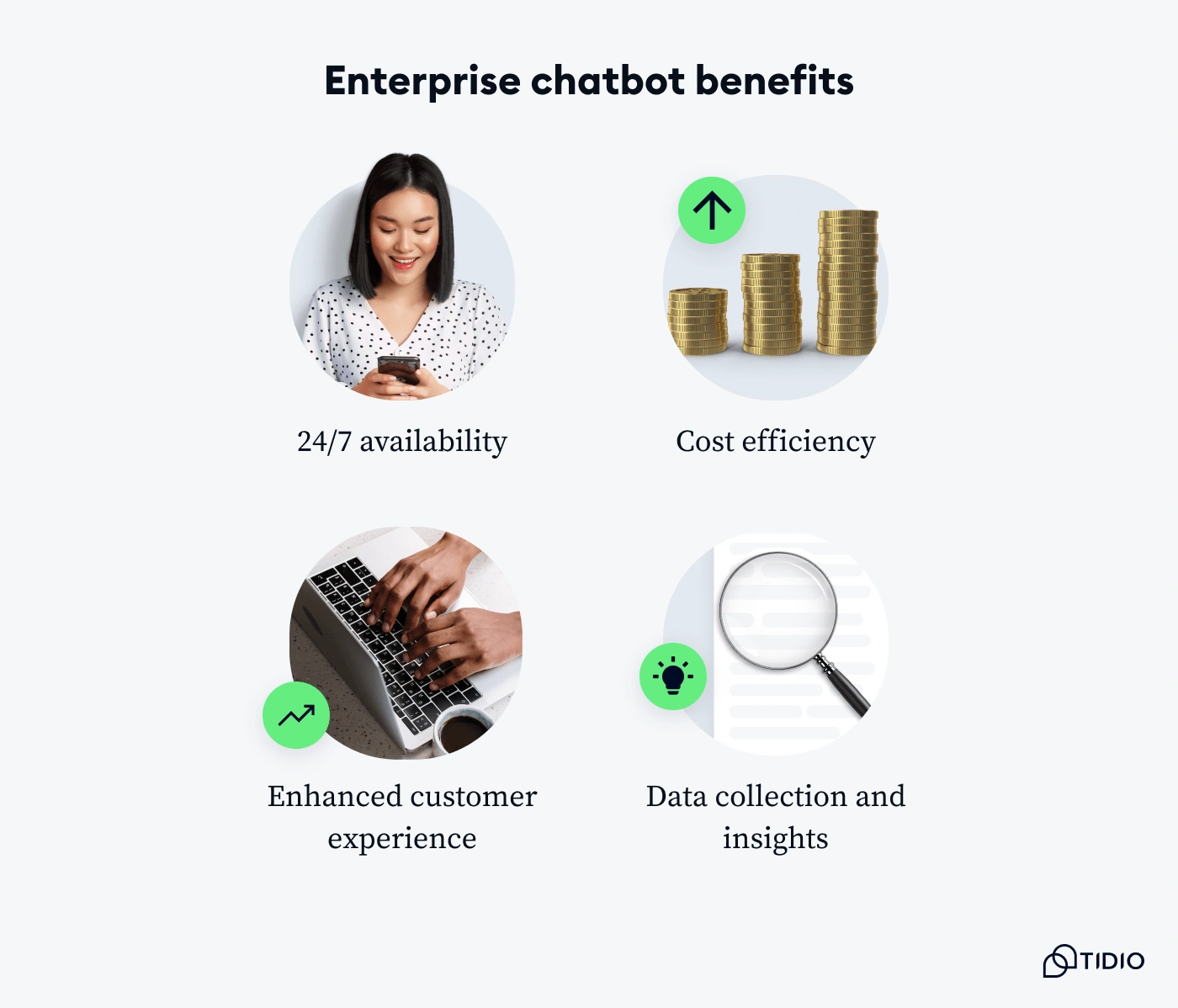
- 24/7 availability: A chatbot for enterprises ensures round-the-clock support, allowing customers to get answers or assistance whenever they need it. This is essential for boosting customer satisfaction since 83% of users expect immediate assistance.
- Cost-effectiveness: By automating routine interactions, chatbots reduce the need for additional agents, cutting operational costs without compromising service quality. For example, a London council saved £48,000 in six months after launching an AI assistant.
- Enhanced customer experience: With personalized, context-aware responses, chatbots provide more satisfying interactions that keep customers happy. In fact, a study shows that intelligent conversational interfaces increase CSAT scores by an average of 12%.
- Data collection and insights: Chatbots capture valuable data from every interaction, helping businesses collect leads, understand customer behavior, and make informed decisions to improve services.
Read more: Check out key benefits of chatbots you should know about.
Features and functionalities of enterprise chatbots
Enterprise chatbots stand out because of their powerful features that truly aid your team. The best platforms are designed to drive efficiency, keep your team focused on high-level requests, and meet your customers on the channels they use most.
Let’s explore some key features, using Tidio’s Lyro AI Agent as an example.
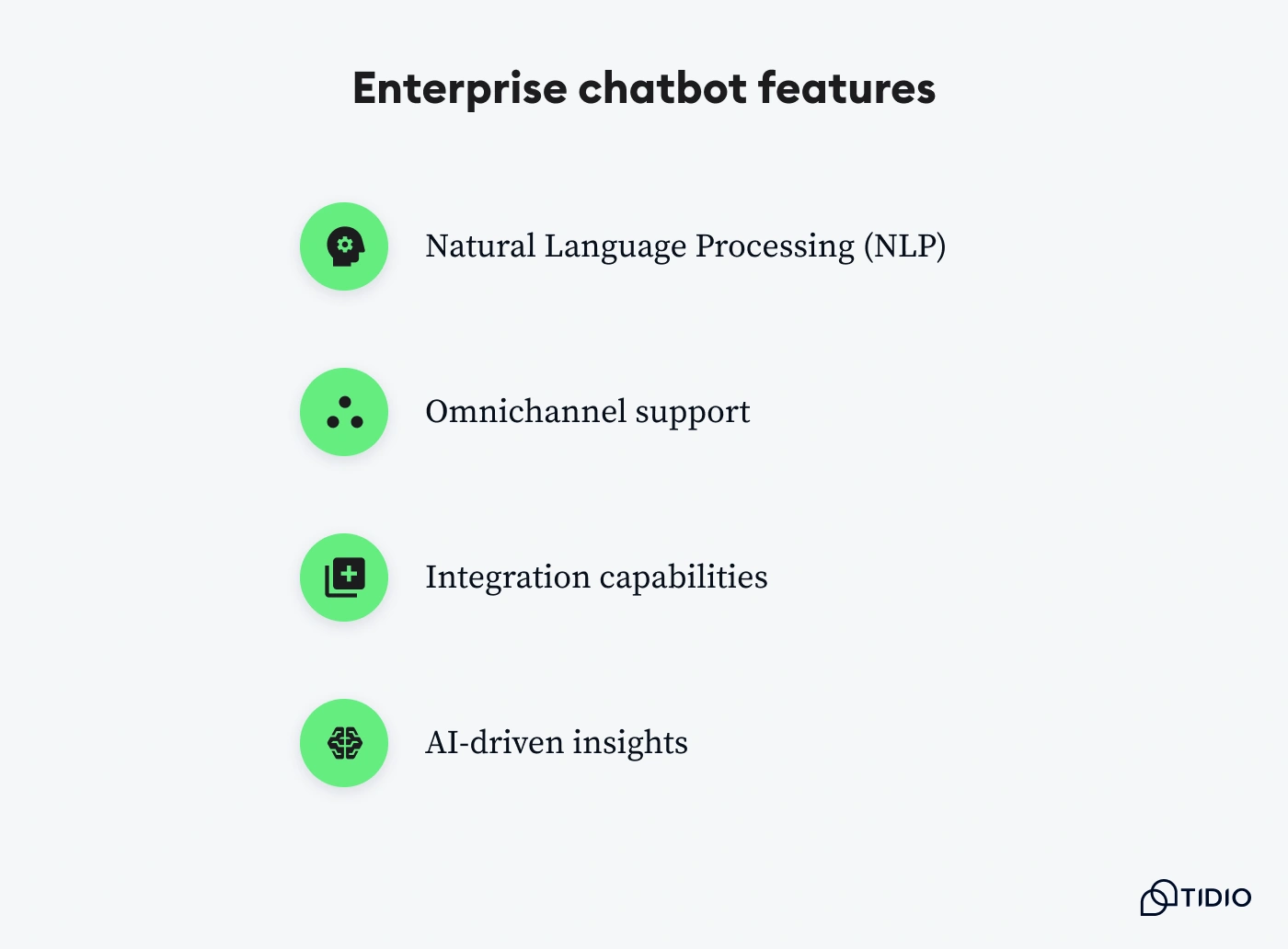
Natural Language Processing (NLP)
NLP is the backbone of any effective enterprise chatbot. It allows chatbots to understand human language, interpret context, and respond in a way that feels natural. Lyro takes this a step further with its advanced NLP capabilities, enabling it to comprehend complex queries, detect user intent, and share accurate information based on your website and knowledge base. Lyro is also a multilingual chatbot that can switch languages in an instant, allowing you to cater to customers worldwide.
Omnichannel support
Modern customers expect support wherever they are, and enterprise chatbots, like Lyro, excel at meeting this demand. Lyro offers omnichannel support, allowing businesses to engage with customers on their website, in messaging apps, via email, and on social media platforms—all while maintaining consistent, high-quality interactions.
Integration capabilities
Enterprise chatbots seamlessly integrate with the tools and platforms your team is already using. For example, Lyro connects effortlessly with ecommerce platforms and ticketing systems, such as Zendesk, enabling it to pull and update data in real time. That way you can automate processes like order tracking and buyer journeys, creating smoother workflows and reducing manual effort.
AI-driven insights
Enterprise chatbots aren’t just great at responding to user queries—they also give you valuable insights into your customers and support gaps. For example, Lyro analyzes interactions to look for patterns and trends, offering your business actionable data to improve your operations and customer experience. For example, our software can identify recurring issues or unanswered questions. It highlights areas for improvement and allows customer service teams to make data-driven decisions.
Read more: Find out more about Lyro—Tidio’s conversational AI chatbot.
Key use cases for enterprise chatbots
Enterprise chatbots are powerful tools that can transform various aspects of your business. From customer support to sales and internal operations, these virtual intelligent assistants are versatile and effective in numerous scenarios.
So, let’s explore enterprise chatbots’ diverse use cases to learn how they can boost customer satisfaction and support your agents.
Providing customer support
The primary use case of chatbots for enterprises is to improve your customer support. An AI chatbot can handle thousands of chats anytime, anywhere.
For example, during peak shopping seasons, an AI-powered chatbot can interpret and respond to a wide array of inquiries, and even perform certain tasks without a human agent having to get involved. That way you can assist more customers with FAQs, such as order statuses and product info, while your agents focus on more complex matters.
Your customers will appreciate the faster response times, and you’ll significantly reduce operational costs by lessening the workload on your human support staff.
What does a chatbot integrated into a large ecommerce platform look like? When a client visits your website and initiates a chat, the bot greets them and may offer several button options to take an action or start a conversation.
For example, if a customer wants to track an order, an AI agent like Lyro can ask for the order number, connect directly to the platform’s order management system, and instantly provide the latest status and expected delivery date.
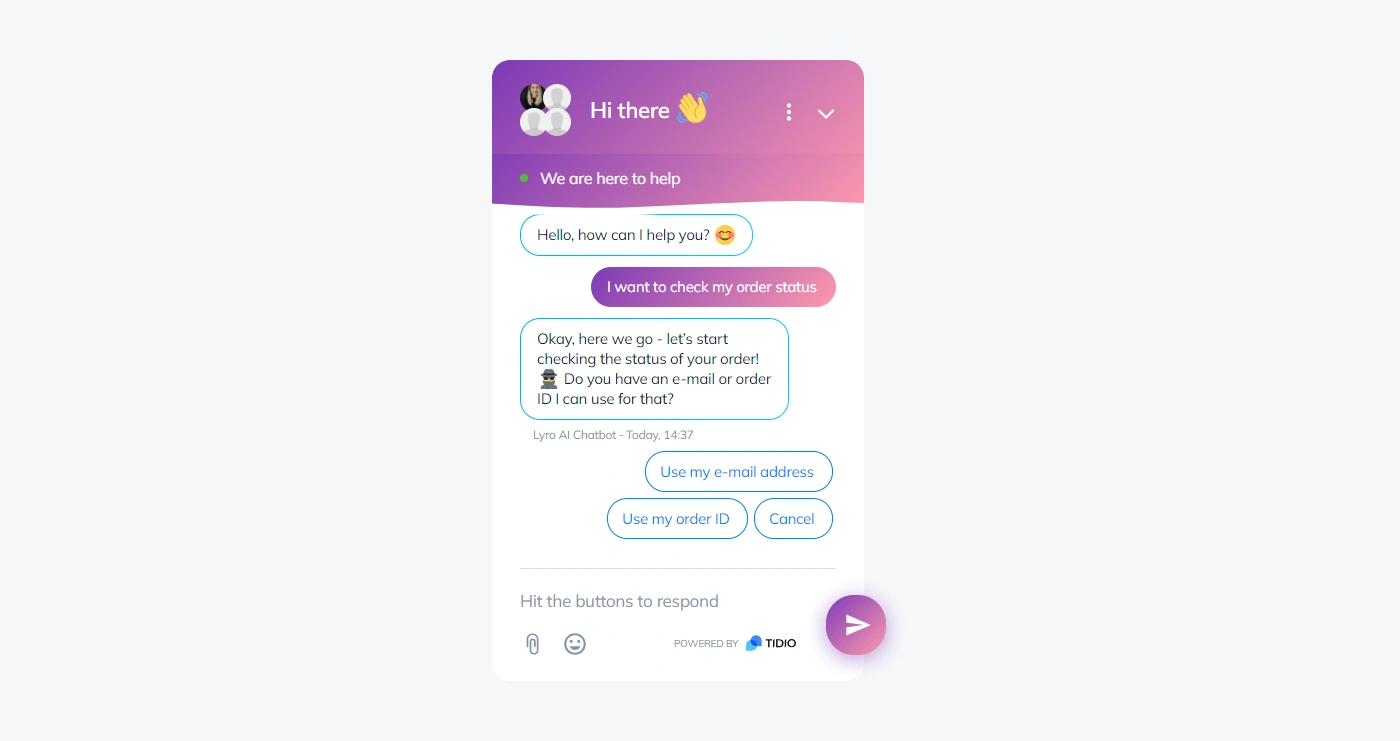
Enhance customer service with Lyro AI chatbot
Driving sales and generating leads
In sales, enterprise chatbots play a crucial role in engaging potential customers and driving conversions. They can interact with website visitors in real time, qualify leads, and offer personalized product or service recommendations.
By guiding users through the sales funnel and providing timely, relevant information, these chatbots enhance the overall customer experience, which increases conversions.
When a potential lead shows interest in a particular service, a chatbot for lead generation, like Lyro, can ask follow-up questions to collect information. This can include their contact details and personal preferences. This approach helps you automatically build a robust customer and lead database for follow-up or tailored communication.
If the lead appears highly qualified, the chatbot can schedule a meeting with a sales representative to ensure your team is immediately speaking to warm leads. Additionally, all gathered data is automatically logged into your CRM system, providing the sales team with valuable insights before the meeting.
Example: La Llave de Oro, a real estate development company, uses Serviceform’s chatbot as a lead generation tool to engage prospects and streamline client interactions. The chatbot guides users to schedule calls with representatives, ensuring potential clients can easily access personalized assistance and move further down the sales funnel.
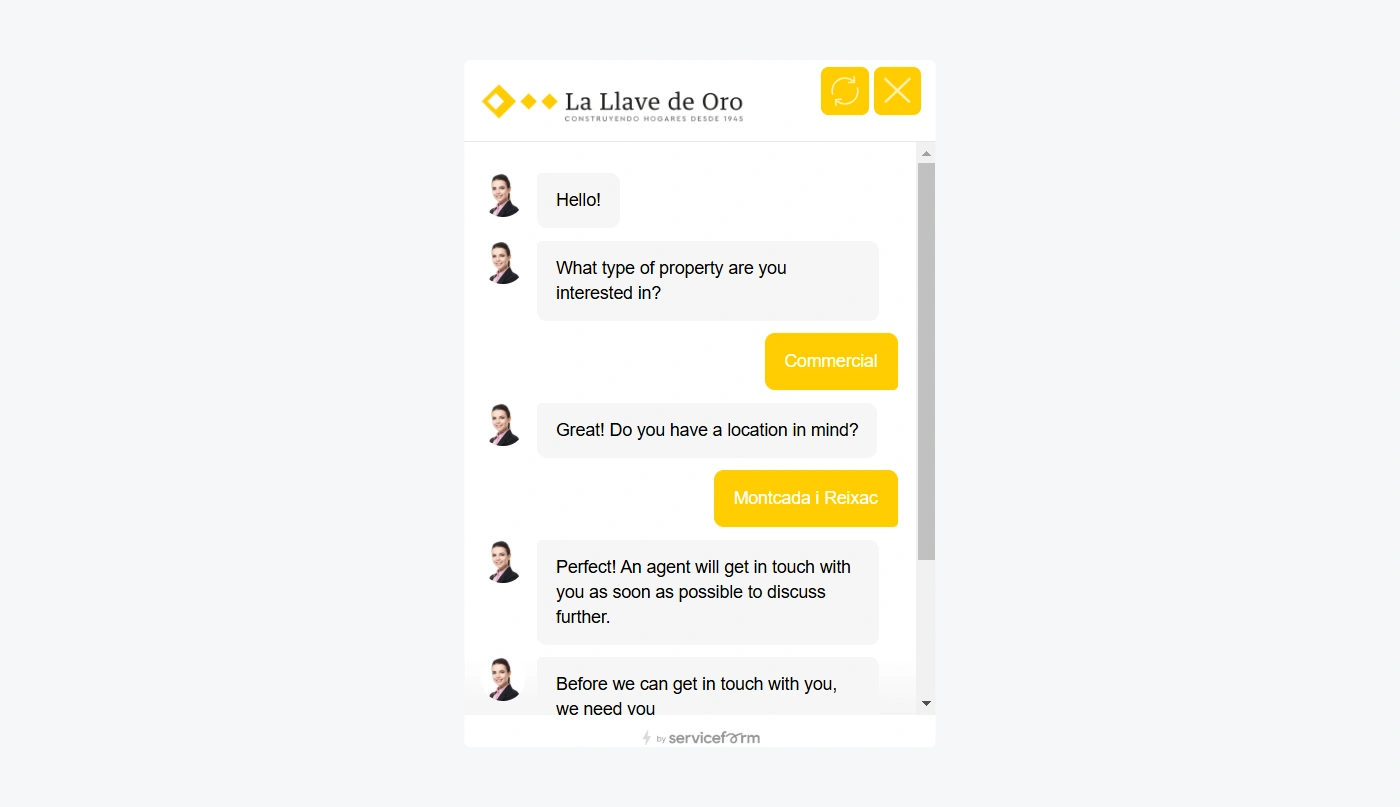
Read more: Find out how Tidio’s support team automated support processes with AI-powered chatbots.
Reducing cart abandonment
Enterprise AI chatbots are capable of proactively approaching customers to keep them on your website and reduce cart abandonment. They can trigger at crucial moments in the buyer journey, like at checkout or on pricing pages.
AI chatbots also make great shopping assistants. They can help find specific products and offer personalized recommendations based on past purchases or browsing history. When a customer checks out, they can help manage their shopping cart and assist with payment processes.
For example, if a customer is looking for a particular type of winter jacket, they can simply type in their requirements. Then, an AI agent like Lyro will filter through the catalog to present the most relevant options.
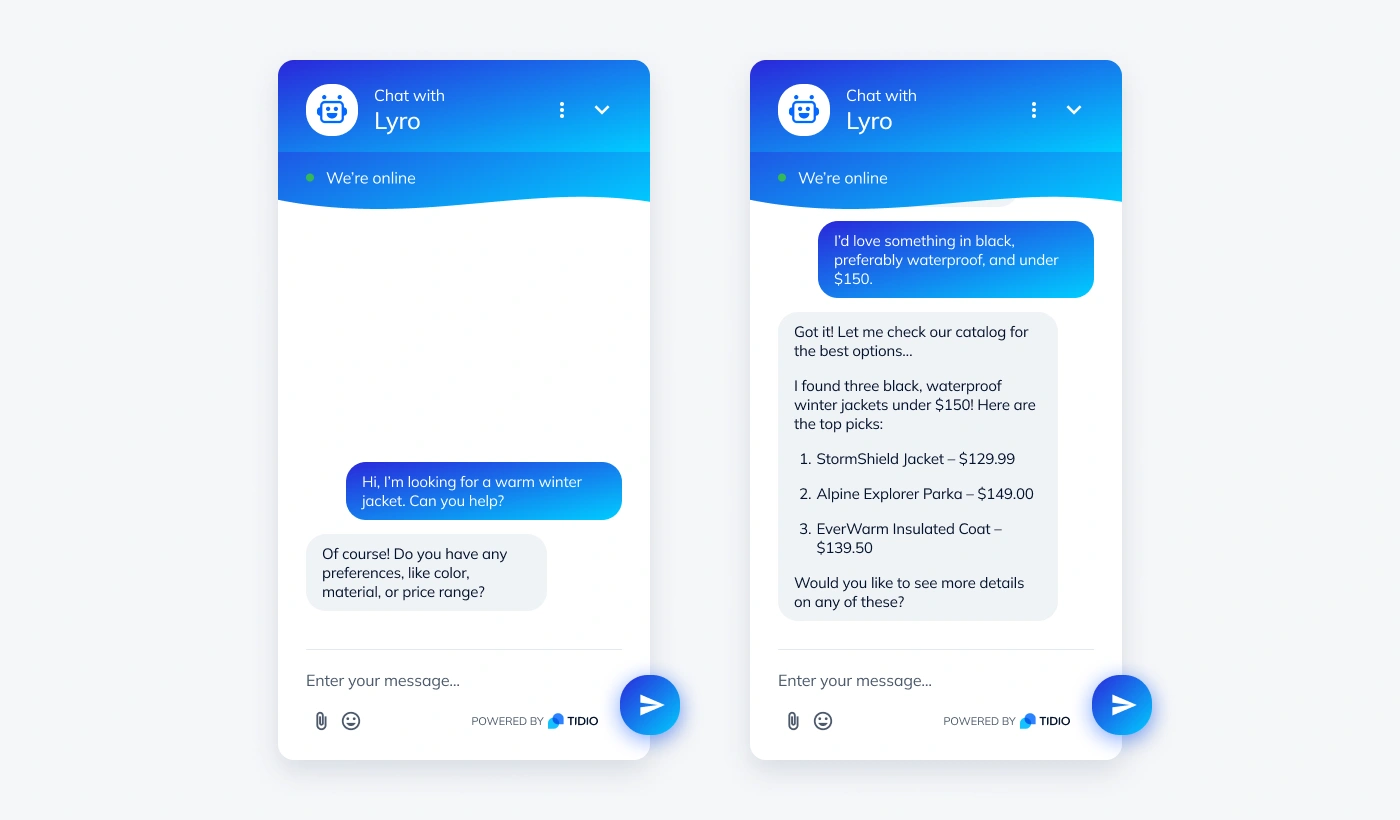
Lyro’s advanced recommendation capabilities allow it to not only find specific products, but also suggest alternatives, complementary items, or seasonal collections. On top of that, if the customer needs assistance with sizing, Lyro can ask for details like height and weight to suggest the best fit, ensuring an informed purchase.
Additionally, Lyro can proactively recommend related accessories, such as scarves or gloves, to the products in the customer’s cart. This strengthens the shopping experience while increasing sales.
Read more: Explore this guide on virtual shopping assistants to learn their benefits, use cases, and how to create one for your needs.
Offering real-time updates
Customers expect instant, proactive updates from businesses—whether it’s tracking an order, confirming a service appointment, or receiving important notifications. AI-powered chatbots help enterprises across industries keep customers informed in real-time, reducing frustration and improving engagement.
For example, AI chatbots can provide itinerary updates for travelers, appointment reminders for healthcare providers, or delivery tracking for ecommerce businesses. Instead of waiting on hold or searching for information manually, customers can simply ask the chatbot and receive instant, accurate responses. This level of personalized and proactive customer service enhances the customer experience, making it more enjoyable and stress-free.
For instance, KLM Royal Dutch Airlines uses its AI-powered chatbot, BlueBot (BB), to assist customers with booking flights, providing real-time travel updates, and even offering packing advice based on destination and weather conditions. By combining automation with human support when needed, KLM ensures travelers receive timely and relevant assistance throughout their journey.
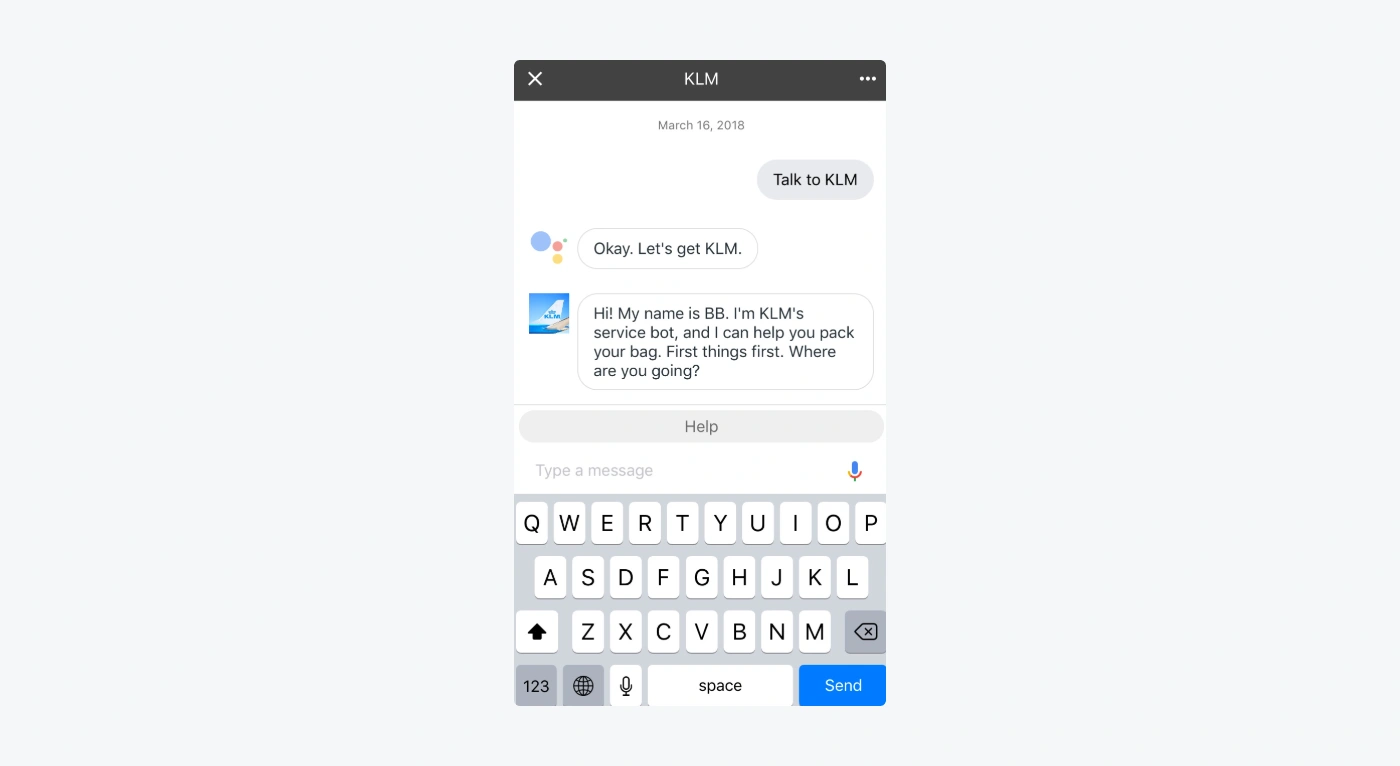
Scheduling appointments and sending reminders
Managing appointments and reminders is a challenge for businesses across industries. AI-powered chatbots streamline this process by automating scheduling and sending timely reminders.
For example, in healthcare, chatbots assist patients in booking doctor visits, reminding them about upcoming appointments, and providing information about medications or treatments. This reduces missed appointments and ensures patients stay on top of their healthcare needs.
Florence is a good example of a healthcare chatbot. It helps patients track their health by monitoring metrics such as body weight or mood, supporting them in reaching their health goals. Florence even reminds users to take their medication or birth control pills.
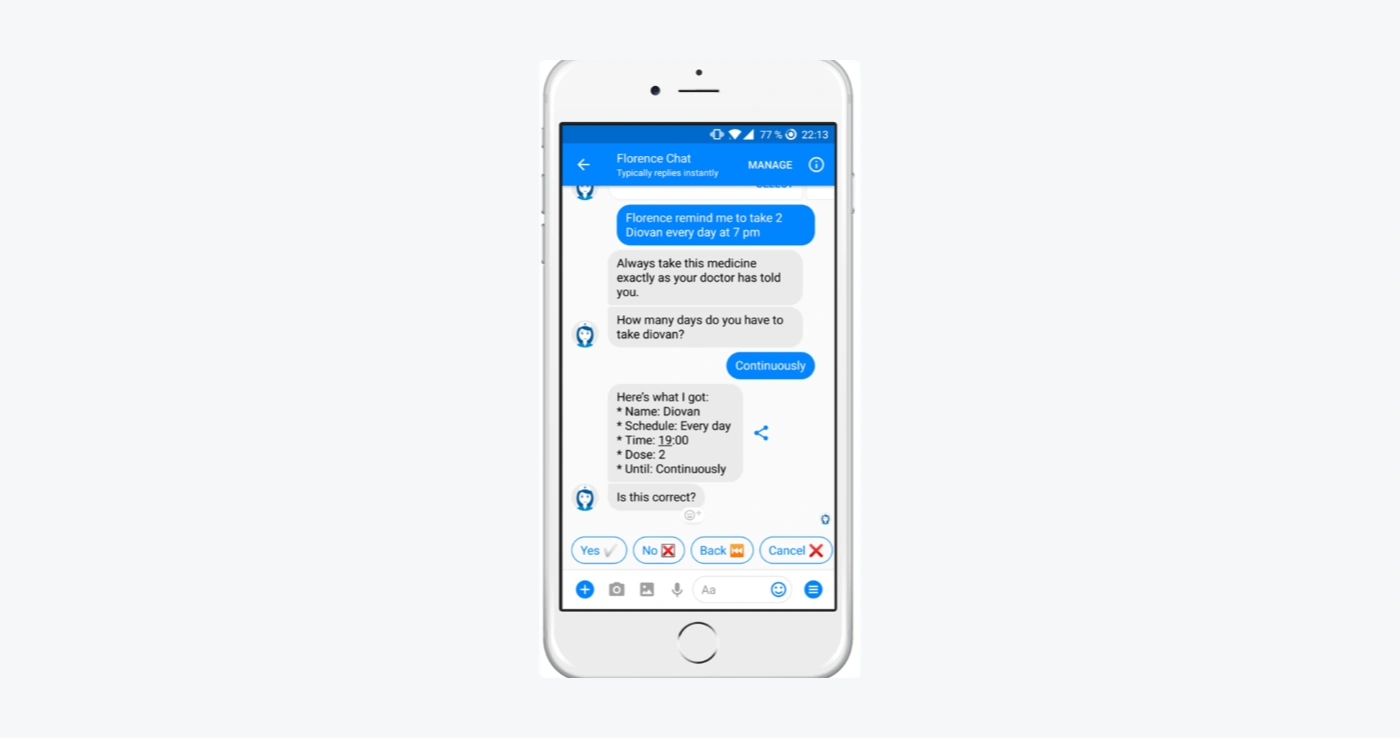
Managing repetitive tasks
Businesses across many different industries face the challenge of handling repetitive tasks without overburdening their teams. AI-powered chatbots help automate routine inquiries, allowing businesses to focus on more complex customer needs.
For example, in retail, advanced shopping bots manage inventory queries, provide store locators, and offer personalized shopping experiences based on customer preferences.
They can also handle customer service issues, such as returns and exchanges, as well as keep clients informed about promotions and discounts.
As an enterprise AI chatbot for websites, Lyro helps users check product availability in real time and keeps clients updated on ongoing promotions or discounts. This creates a seamless and engaging experience.
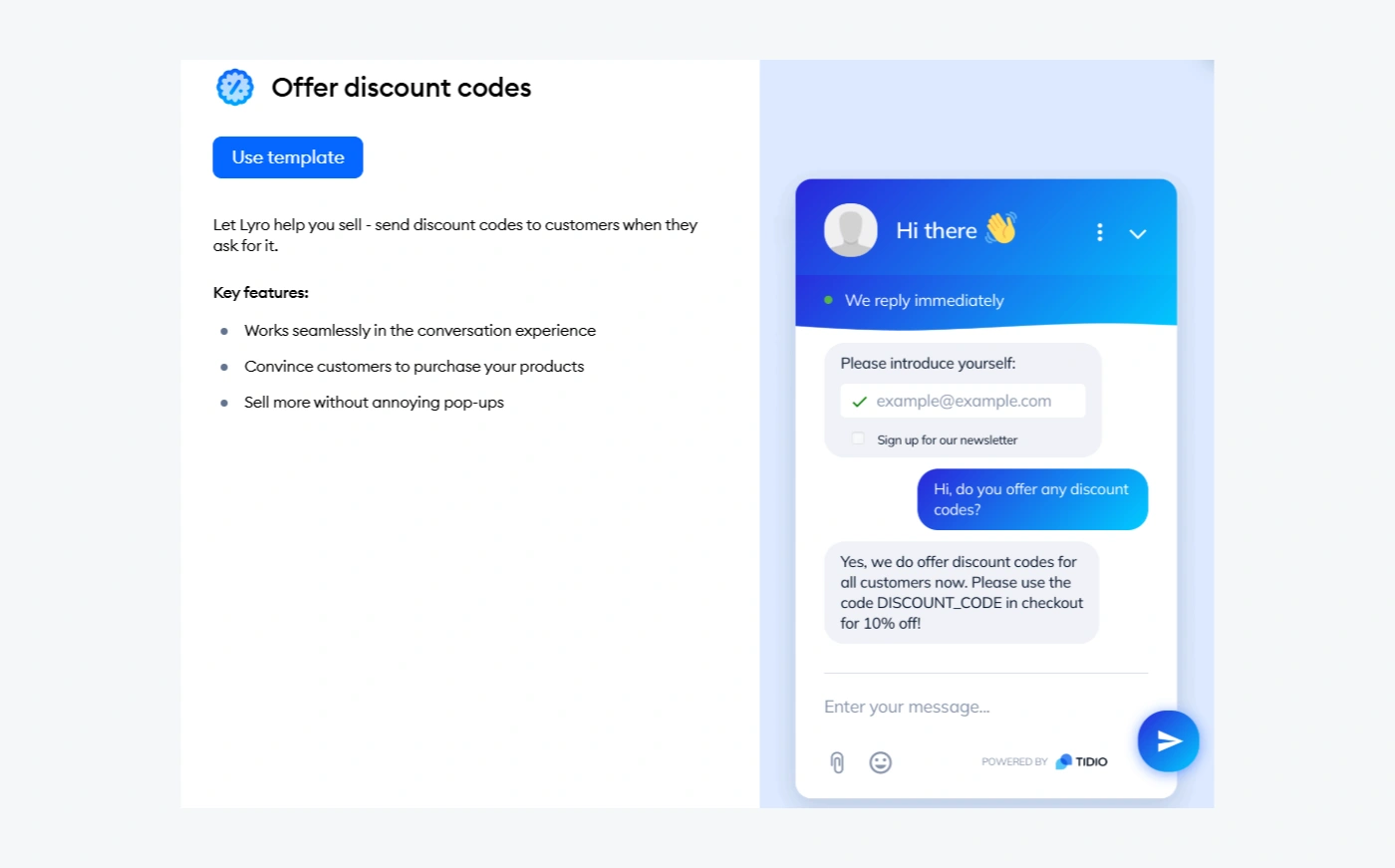
Read more: Find out all you need to know about retail chatbots. Also, be sure to check out these practical chatbot use cases while you’re at it.
How to successfully implement an enterprise chatbot
Whether you’re switching AI platforms or using an AI chatbot for the first time, it’s important to have a plan. Implementing a chatbot for your enterprise business is much more than just choosing the right technology.
Here are key steps to ensure your enterprise bot exceeds expectations for your business and customers.
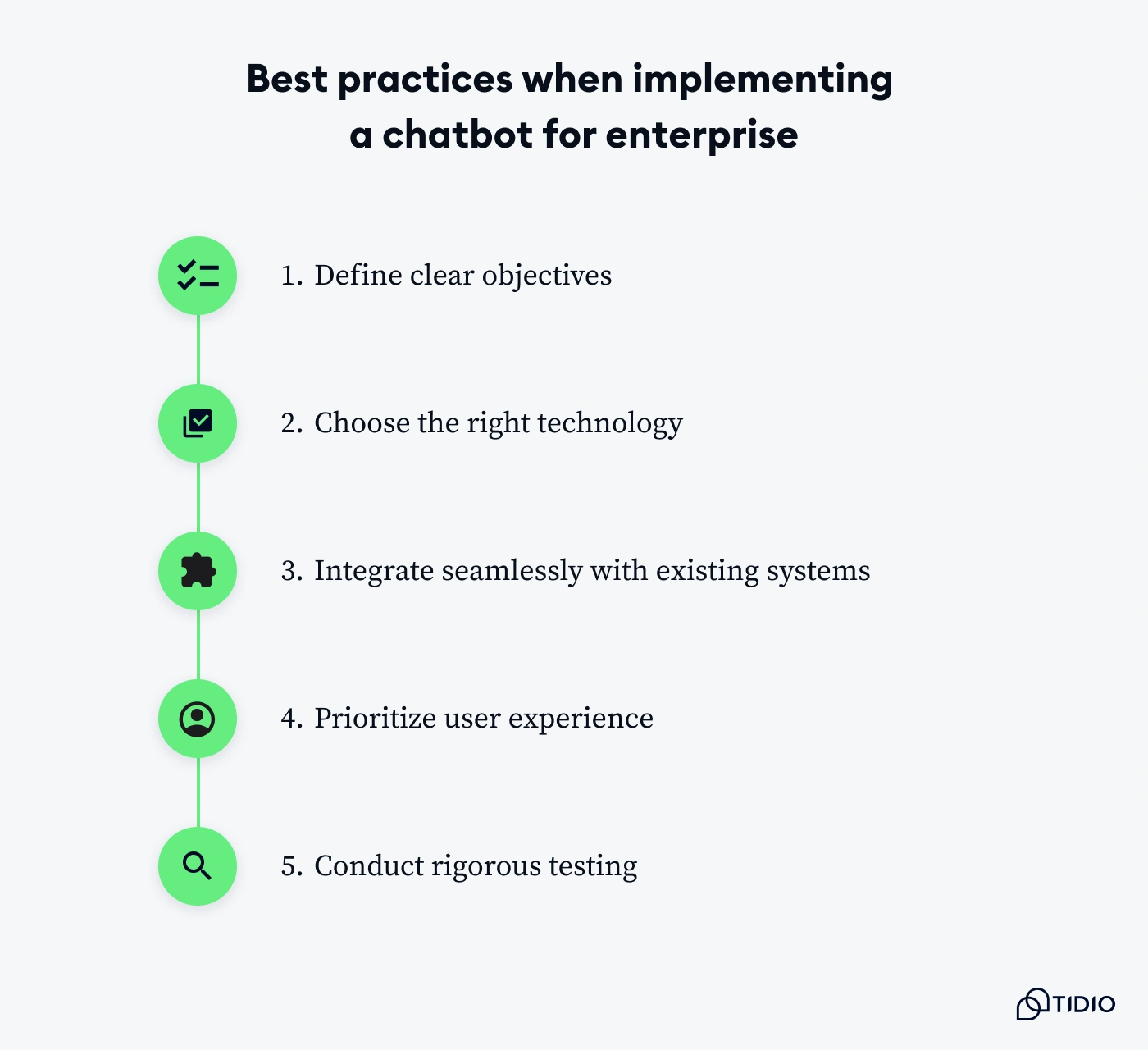
1. Define clear objectives
Before you start creating your chatbot, it’s essential to specify clear objectives. What do you want the bot to achieve? Whether it’s improving customer support, increasing sales, or streamlining processes, having well-defined goals will guide the entire development and implementation process. By setting specific, measurable objectives, you can ensure that your chatbot aligns with your business needs and delivers tangible value.
Read more: Learn the key steps for a great chatbot implementation strategy.
2. Choose the right platform
Selecting the right enterprise AI chatbot platform is critical for creating a bot that meets your business needs. Look for enterprise chatbot solutions that offer scalability, integrations with existing systems, and advanced AI capabilities.
Tidio is a great example of a platform with a robust Lyro AI chatbot that can be easily trained using an existing knowledge base, either by pulling data from a webpage or through manual input.
Lyro’s automation capabilities significantly reduce the workload on customer support teams by handling an average of 70% of conversations without human intervention. For enterprises with large customer service teams, this translates to substantial time savings and cost efficiency.
Instead of hiring additional agents to scale operations, businesses can rely on Lyro to manage high volumes of inquiries while ensuring seamless omnichannel support. Also, with built-in features like agent routing, ticketing, and email support, Lyro helps enterprises optimize resources and improve overall ROI—allowing human agents to focus on complex interactions.
Read more: Here are tips for building an excellent knowledge base chatbot.
3. Integrate seamlessly with existing systems
For your enterprise AI chatbot solution to be truly effective, it must be seamlessly integrated with your existing business systems such as CRM, ERP, and databases. This integration allows the chatbot to access real-time information and provide accurate responses at all times.
So, it’s essential to ensure that your chatbot can pull data from and push data to these systems without causing disruptions. Well-integrated bots for enterprise will enhance operational efficiency and provide a more cohesive user experience.
4. Configure for user experience
When implementing an enterprise chatbot, user experience is everything. Customers expect smooth, natural interactions that feel effortless, and the best AI solutions deliver just that. Instead of relying on rigid scripts, a solution like Lyro learns directly from your business data—whether it’s your website content, FAQs, or knowledge base—to provide accurate, human-like responses without requiring manual script writing.
Lyro understands user intent and answers questions dynamically, much like a trained support agent. However, just as human agents use canned responses for efficiency, Lyro allows businesses to set predefined answers for specific queries while still adapting to live conversations.
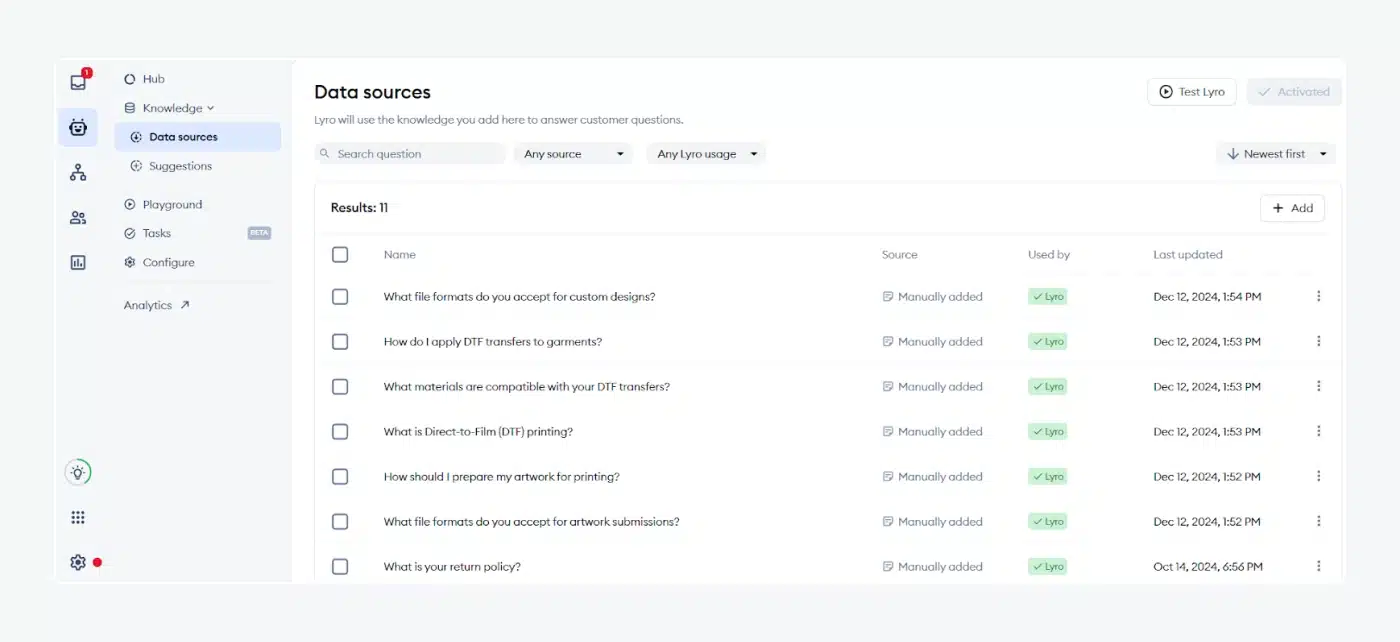
This means Lyro performs like a new employee, learning from available data and handling customer inquiries autonomously. The AI continuously improves through interactions, creating an engaging experience for customers
5. Conduct rigorous testing
Before a full-scale launch, pilot your chatbot with a smaller audience to identify any gaps in performance. Conduct rigorous testing across platforms and devices, paying close attention to how it handles complex queries and edge cases. After deployment, use analytics to track performance and identify opportunities for improvement.
For example, Lyro provides chatbot analytics with metrics such as resolution rate and insights into unanswered questions. This allows businesses to continuously optimize their chatbot’s performance and ensure it evolves alongside user needs.
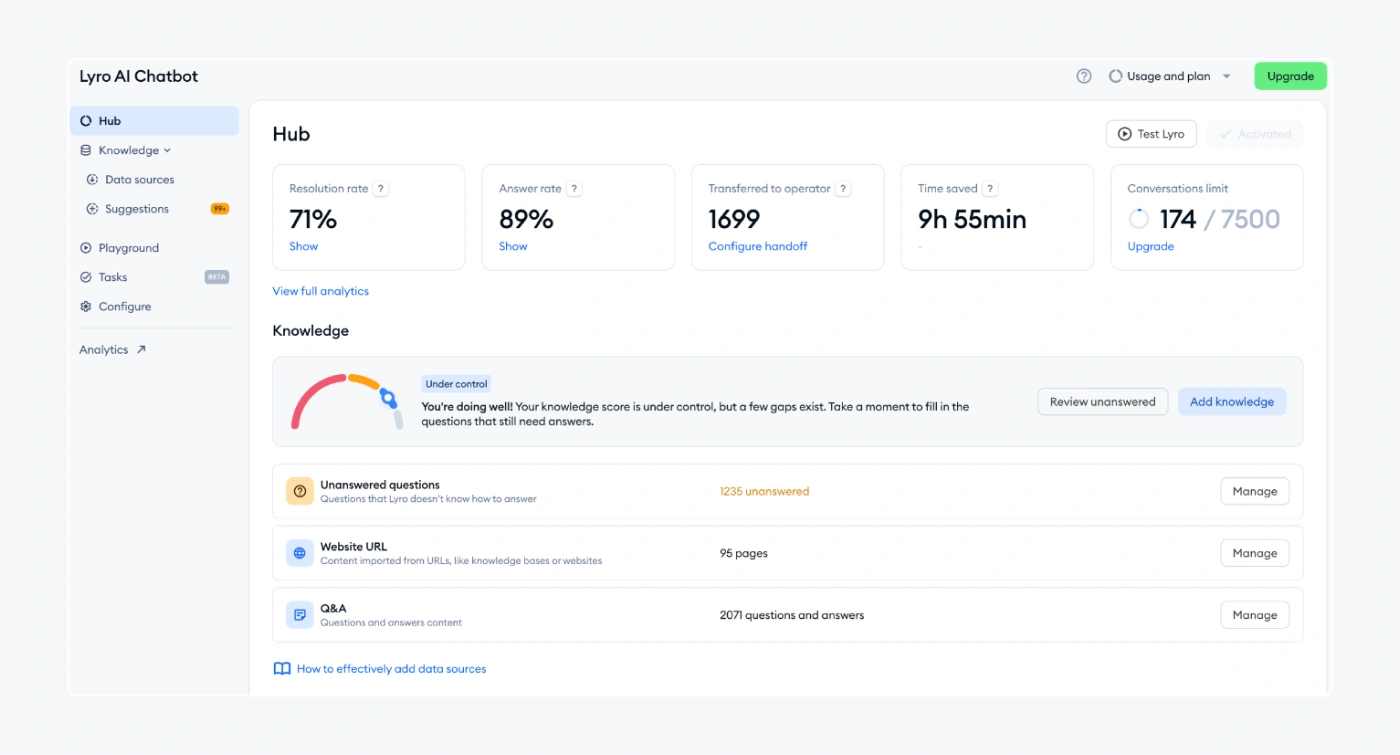
If you follow these chatbot best practices, you can implement an enterprise conversational AI that not only meets your business needs but also delivers exceptional value and user experiences.
Transform your enterprise with Lyro AI Agent
From streamlining support to offering personalized assistance, enterprise chatbots are becoming essential tools for delivering a better overall experience while keeping up with modern demands. By implementing a well-designed chatbot, you help your enterprise stay competitive and find smarter ways to solve customer and business challenges.
Lyro AI Agent is changing the way businesses connect with their customers and manage everyday operations. With its ability to integrate seamlessly into your systems, adapt to your brand’s voice, and provide real-time support, this enterprise bot solution is built to help you meet your goals without the complexity.
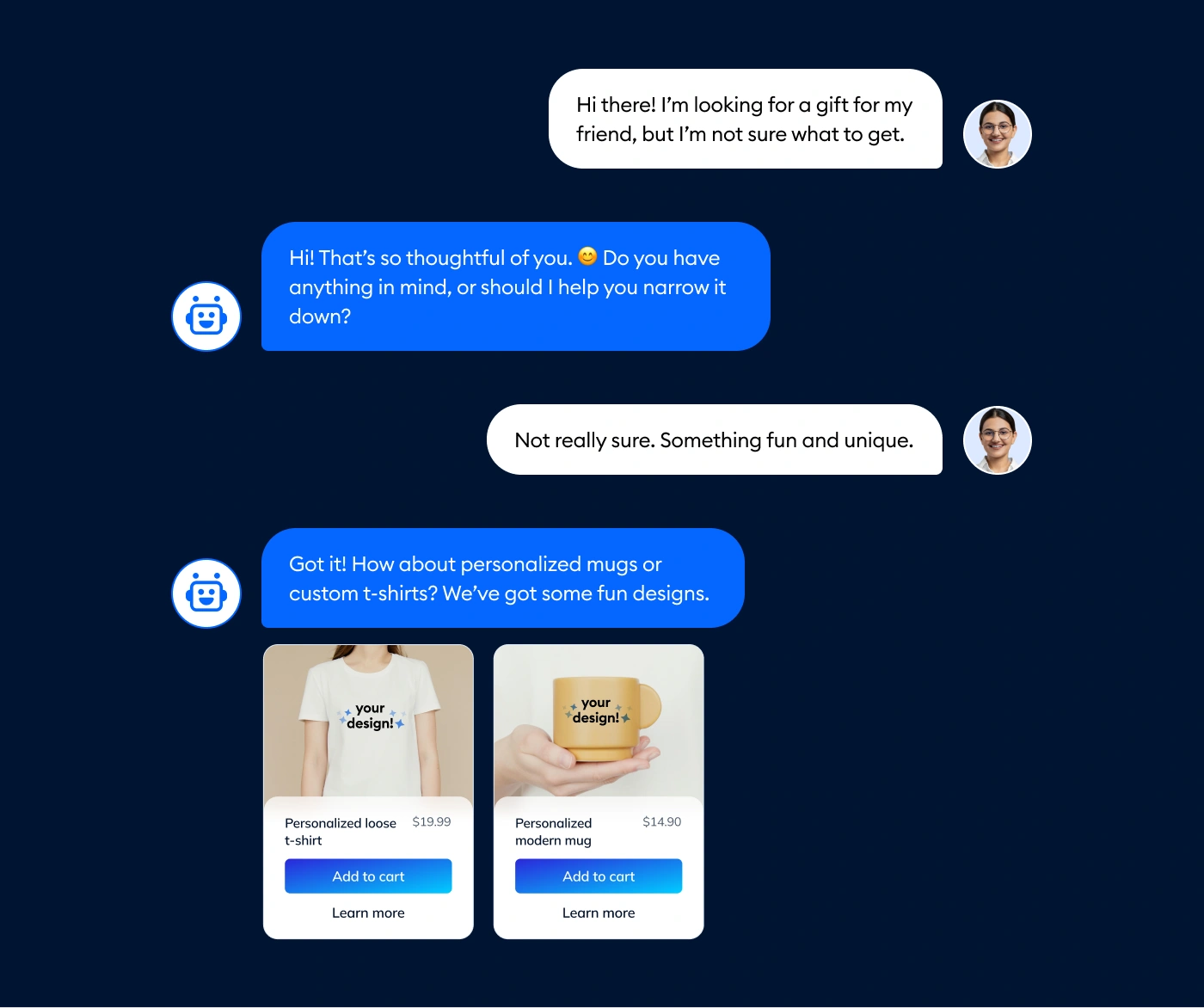
Whether it’s improving customer satisfaction or simplifying workflows, Lyro can handle the demands of enterprise support.
Take Lyro for a spin today and see how it can make a difference for your business!
Enhance customer service with Lyro AI chatbot
Frequently asked questions
Start by defining clear goals for your chatbot. Then, choose an enterprise chatbot platform with robust AI capabilities, like natural language processing and machine learning. Moreover, ensure the software integrates with your existing systems (e.g., CRM), design a user-friendly interface, and test extensively before full deployment.
Enterprise conversational AI is a technology designed to enable advanced, human-like interactions between businesses and users through chatbots. It combines natural language understanding, machine learning, and automation to streamline repetitive tasks like customer support, sales, and operations.
Enterprise bots automate processes like handling FAQs, qualifying leads, managing appointments, and providing personalized recommendations. They help businesses improve efficiency, enhance customer experiences, and save time across various industries.

